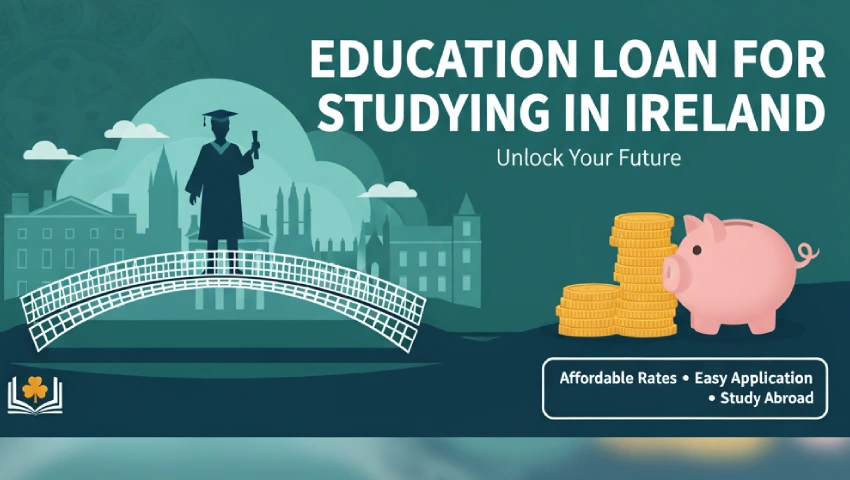Studying in Ireland has become a popular choice for Indian students due to its globally recognised universities, multicultural environment, and strong career opportunities. However, the study in Ireland cost, including tuition, living expenses, and other essentials, can be significant.
For many students, an education loan for studying in Ireland provides the financial support needed to pursue higher education abroad without unnecessary stress.
Why Choose Ireland for Higher Education
Ireland is home to some of Europe’s top universities, offering courses in business, engineering, technology, healthcare, and other fields. The country attracts thousands of international students with:
- An English-speaking environment which makes academic and social integration easier.
- Global career opportunities, especially in technology, finance, and healthcare sectors.
- Post-study work visas allow students to gain valuable international work experience.
For Indian students, the combination of high-quality education and career prospects makes Ireland an attractive destination for both undergraduate and postgraduate studies, including popular programs like the MBA.
Understanding the Cost of Studying in Ireland
Before applying for an education loan, it is important to understand the cost of studying in Ireland. This includes tuition fees, living expenses, and other necessary costs. The table below summarises the average annual expenses for Indian students:
| Expense Category | Approximate Annual Cost (€) |
| Tuition Fees (Undergraduate/Postgraduate) | €12,000–€25,000 |
| MBA Ireland Cost | €20,000–€30,000 |
| Living Expenses | €9,000–€12,000 |
| Ireland Study Visa Cost / Student Visa Ireland Cost | €60–€100 |
| Health Insurance | €500–€1,000 |
| Miscellaneous (Books, Travel) | €1,000–€2,000 |
These costs vary depending on the university, course, and lifestyle of the student. An education loan helps cover these expenses and makes studying in Ireland financially manageable.
Why Take an Education Loan for Ireland
Education loans are essential for many students wishing to study in Ireland. The advantages include:
- Coverage of tuition and living expenses, enabling students to focus on their studies.
- Financial flexibility reduces the need for large upfront savings.
- Tax benefits are available under certain Indian tax provisions for education loans.
- Flexible repayment options after graduation or post-study employment.
An education loan ensures that financial barriers do not prevent deserving students from pursuing their dream of studying in Ireland.
Types of Education Loans for Studying in Ireland
Indian students can choose between government banks, private banks, and non-banking financial companies (NBFCs) for education loans.
1. Government Banks
Government-backed banks provide affordable interest rates and long repayment periods.
- Interest Rate: 9–10% per annum
- Repayment Tenure: Up to 15 years
- Moratorium Period: Course duration plus 1 year
2. Private Banks
Private banks offer faster processing and flexible disbursement options.
- Interest Rate: 10–12% per annum
- Collateral: Usually required
- Partial Disbursement: Available for tuition and living expenses
3. NBFCs and International Loan Providers
These institutions cater to students without collateral or co-applicants and offer tailored repayment plans.
- Interest Rate: 11–14% per annum
- Quick Approvals: Minimal documentation required
- Flexible Coverage: Tuition, living, travel, and insurance
Eligibility Criteria for Education Loans
The eligibility requirements generally include:
- Indian citizenship
- Admission confirmation from a recognised Irish university
- Co-applicant (parent or guardian) with stable income
- Strong academic record
- Ability to repay the loan after course completion
Meeting these criteria increases the chances of loan approval.
Disclaimer: Eligibility criteria may vary between banks and lenders. Always check the specific requirements of the loan provider before applying.
Documents Required for Ireland Education Loans
To ensure smooth processing, students should prepare the following documents:
- Admission letter from the Irish university
- Academic transcripts and certificates
- KYC documents of the student and the co-applicant
- Income proof of the co-applicant, such as salary slips or tax returns
- Collateral documents, if applicable
- Passport and visa details
- Detailed course fee structure and estimated living expenses
Completing documentation accurately reduces delays and improves approval timelines.
Disclaimer: Document requirements may vary depending on the lender or financial institution. Always verify the exact documents needed with your loan provider before submission.
Loan Coverage: What Expenses Can an Education Loan Pay For
Education loans for Ireland typically cover:
- Tuition fees and examination charges
- Accommodation and living expenses
- Travel and visa costs
- Study materials and health insurance
This ensures students are fully supported financially during their study period.
Repayment and Moratorium Period
Repayment for education loans typically starts 6 to 12 months after completing your course or once you secure a job, giving students a grace period to settle into their careers. This period, known as the moratorium period, allows borrowers to focus on gaining work experience and earning an income before beginning repayments.
The total repayment tenure for education loans can vary widely, usually ranging from 7 to 15 years, depending on the total loan amount, the lender’s policies, and the borrower’s financial situation. A longer repayment period can help keep monthly installments manageable, especially for students starting their careers, while shorter tenures allow for faster loan closure with less interest paid over time.
It is important to carefully consider your expected future income and expenses when choosing a repayment plan. Many lenders also offer flexible EMI options, allowing you to adjust monthly payments according to your financial capabilities. Planning your repayment strategy in advance ensures a smoother financial journey and reduces the risk of default.
Tips for Quick Loan Approval
Following a few simple steps can help ensure your education loan application is processed quickly and smoothly.
- Start the loan application at least 3 to 4 months before visa submission.
- Maintain a strong academic record and prepare a clear Statement of Purpose (SOP).
- Ensure the co-applicant has a stable income and good credit history.
- Provide accurate estimates of tuition, living, and visa costs.
- Keep all documents organised and up to date.
Following these steps can make the approval process faster and smoother.
Conclusion
Studying in Ireland is a valuable investment in your future, and an education loan can make it achievable for Indian students. From covering tuition to living expenses, education loans help remove financial barriers and allow students to focus on academics and career growth.
With proper planning, timely application, and careful management of finances, Indian students can secure the most suitable loan options to support their study journey. Starting early, understanding costs, and following the eligibility requirements ensure a smooth process and a successful experience abroad.

Supriya Sawant is an accomplished Education Counsellor and Manager with 7+ years of experience in guiding students toward academic success. Specializing in higher education opportunities in the UK and Ireland, she is a trusted advisor and a favourite among her students. Supriya is known for her approachable style, insightful guidance, and dedication to student growth.


